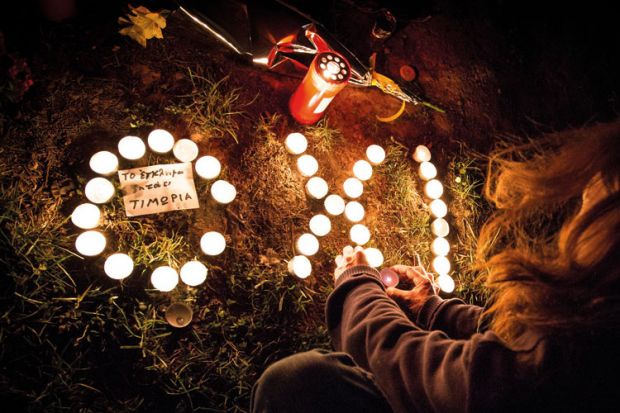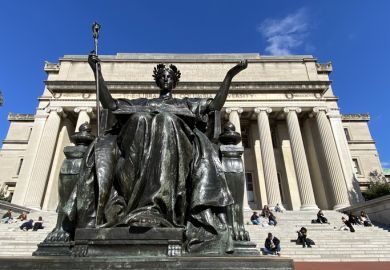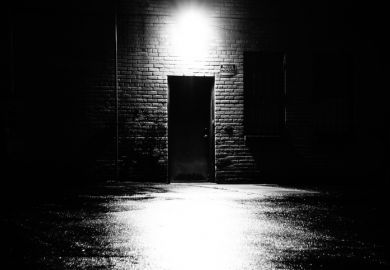Source: PA
Not forgotten: tributes mark the first anniversary of Dimitris Christoulas’ suicide
A new film by Kingston University academics, which will be screened at the London Film Festival on 9 October, reveals how ancient Greek tragedy can help to illuminate the plight of Greece today.
Director Ken McMullen, anniversary professor of film studies, said: “I was affected quite strongly by things I’d seen in Greece during the early phases of austerity” – notably the public suicide in 2012 of retired chemist Dimitris Christoulas. He also witnessed a demonstration in which anarchists threw Molotov cocktails at police and a television truck was set alight and destroyed.
A keen student of ancient drama, Professor McMullen was also struck by the way that “when the crisis really hit Greece, people I spoke to kept unconsciously coming up with lines almost identical to those in the plays”. It was this that led him to attempt “a different sort of commentary”, which developed into OXI: An Act of Resistance.
The film interweaves extracts from ancient thinkers and playwrights, interviews with contemporary philosophers and political theorists, and sharp commentary by Greek activists and citizens. “They have predicted it already,” claims nonagenarian politician, writer and former resistance fighter Manolis Glezos, “both the Greek philosophers and ancient Greek poetry…Sophocles said it in Antigone. Other Greeks have said it: ‘Loans turn people into slaves’.”
Antigone – in which the heroine defies her uncle, King Creon, in her determination to bury her traitorous dead brother Polyneices – is a particular touchstone. “The play asks where duty lies, where responsibility lies beyond the imperatives of state,” said co-producer Martin McQuillan, professor of literary theory and cultural analysis. This makes it, he said, a “cult text among philosophers” interested in political morality and civil disobedience.
As an example of how Antigone’s “act of resistance” remained relevant and inspiring, Professor McQuillan cited a scene in OXI where “doctors are running a sort of pop-up hospital, giving their time for free and using drugs donated by people who didn’t need all of them. They were explicitly told by the Ministry of Health that they were not allowed to give out such unauthorised drugs.”
Professor McMullen said that he was worried that the Greek economic crisis was only the start of something bigger. The wider resonances of the film also came home to him when it got “a very strong response in Russia”, with viewers assuming that the conflict between Creon and Antigone was “really” about Vladimir Putin and the punk rock protest group Pussy Riot.
Register to continue
Why register?
- Registration is free and only takes a moment
- Once registered, you can read 3 articles a month
- Sign up for our newsletter
Subscribe
Or subscribe for unlimited access to:
- Unlimited access to news, views, insights & reviews
- Digital editions
- Digital access to THE’s university and college rankings analysis
Already registered or a current subscriber? Login





